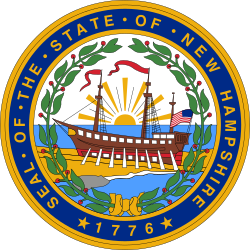| |||||||||||||||||||||
| |||||||||||||||||||||
 County results Martin: 40–50% 50–60% 60–70% Sawyer: 40–50% | |||||||||||||||||||||
| |||||||||||||||||||||
| Elections in New Hampshire |
|---|
 |
The 1852 New Hampshire gubernatorial election was held on March 9, 1852, in order to elect the Governor of New Hampshire. Democratic nominee and former member of the New Hampshire House of Representatives Noah Martin defeated Whig nominee Thomas E. Sawyer and Free Soil Party nominee John Atwood. [1]

